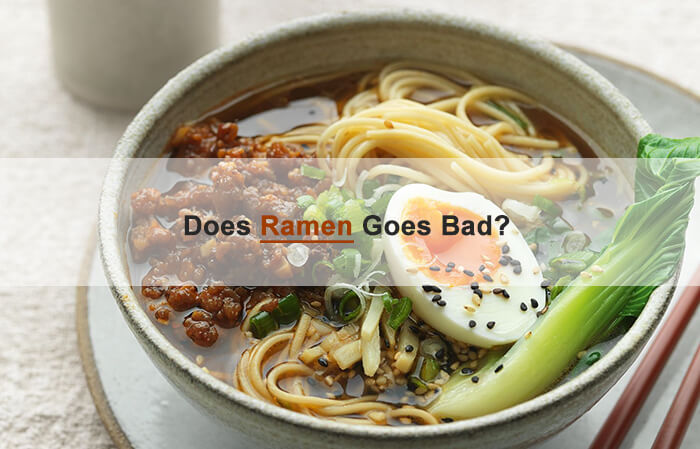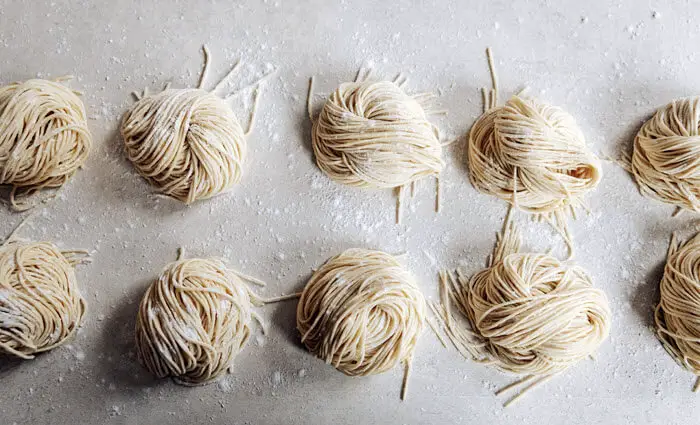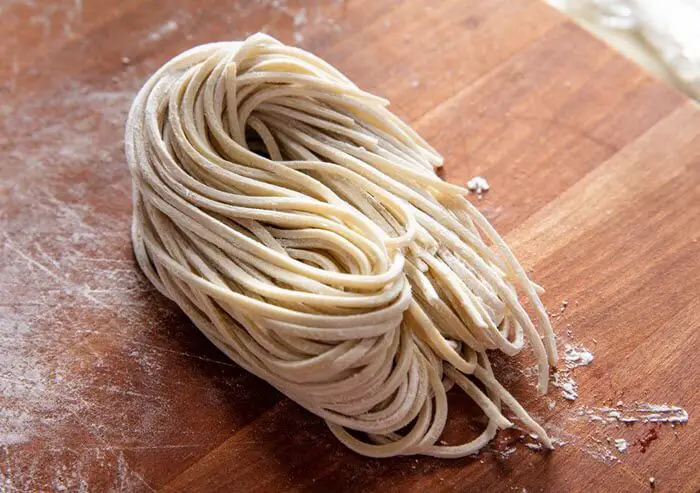Ramen noodles: a college delicacy and late-night snack.
Ramen noodles are quick and easy to make, which makes them a go-to meal for many people on the go. Often, people buy them in bulk and store them in the pantry to enjoy later.
But that storage method brings up the question, “Do ramen noodles expire?”.
Before your next shopping trip to buy in bulk, here are tips to remember to keep ramen noodles fresh.
Table Of Contents
Do Ramen Noodles Go Bad
While making your late-night ramen, you may have wondered if the food ever goes bad. It’s not a food you eat every day, so you never really thought about it.
In fact, you buy it in bulk and stick it in the cabinet to have when you can’t sleep or want to make something easy for dinner. Since you buy them to eat periodically over a long period, you never really think about if they go bad.
So, do ramen noodles expire?
Unfortunately, yes. Like most foods, ramen noodles don’t aren’t good to eat indefinitely. So you’ll probably want to check the dates on the packs of ramen in your cabinet.
What Types of Ramen Noodles Expire
You’ll first want to be aware of the type of ramen you’re buying.
- Boxed instant ramen noodles have a long shelf life when unopened.
- Wheat ramen is often not processed as instant noodles and has a shorter expiry time.
- What you must take caution with are fresh ramen noodles as they have the shortest shelf life.
There is some good news, though! You probably don’t have to go into your cabinet and purge every packet of ramen that’s past its due date.
Because of the added preservatives, it’ll be okay to eat most ramen after the date on the packaging.
How Long Do Ramen Noodles Last
How long ramen noodles last depends on what kind of ramen you have.
Most packaged noodles will retain their quality past the best-by date on the packaging. But they aren’t a forever food, so it’s important to know when it’s safe to eat the different types of ramen.
Ramen types | Pantry | Fridge | Freezer |
Instant | 6 to 8 months | 2 to 3 months | Up to one year |
Wheat | About 4 months | 2 to 3 months | About 4 months |
Fresh | Up to lable date | 10 days | About 2 months |
Cooked | / | About 6 days | About 2 months |
Cup | About 4 months | 2 to 3 months | / |
Instant Ramen Noodles
Out of all the types of ramen, boxed instant noodles will last the longest time in your cabinet.
So, how long are Maruchan ramen noodles good for? You can enjoy these noodles and other instant ramen noodles for up to about a year after the best-by date.
Wheat Ramen Noodles
As previously stated, wheat ramen noodles don’t have as many preservatives as boxed instant noodles.
The lack of preservatives is often a plus for the health-conscious, but it also means that you won’t be able to leave them in the pantry as long as instant noodles.
You’ll be able to enjoy wheat ramen noodles between about three and six months after the best-by date.
Fresh Ramen Noodles
The type of ramen that will go bad the quickest is fresh noodles. These noodles you’ll have to keep in the refrigerator rather than the pantry.
You should aim to eat fresh ramen noodles between about two to three weeks after opening the packaging.
How To Tell If Ramen Noodles Are Bad
It is safe to eat ramen noodles past the best-by date on the packaging. Great! Unless you’ve had the same package in your cabinets for five years, you can enjoy your ramen with some peace of mind.
But let’s say your ramen is on the cusp. It’s a couple of days after the six months or the year after the best-by date.
Can you still enjoy your go-to midnight snack? How can you tell if the noodles have gone bad?
Instant Noodles
For instant noodles, if there isn’t moisture in the package, they should be okay to eat.
- When you open the bag, examine the block of noodles. Crush and break them aside to ensure they aren’t mushy.
- You should also look for mold or bugs in the packaging.
- Smell the noodles and ensure they don’t have an off odor.
If none of these are present, your ramen noodles have not gone bad and are probably safe to eat.
How to Tell if Wheat Noodles Go Bad
Use a similar method to assess wheat noodles.
As long as there is no moisture in the packaging, there are no bugs or mold on the noodles, and they don’t smell bad, the noodles should be safe to eat.
Instant and wheat noodles don’t spoil in a traditional way that makes them unsafe to eat. If the ramen does go bad, it may taste stale after cooking, but it shouldn’t make you sick as long as all of the above conditions are met.
Be Cautious With Fresh Ramen Noodles
The kind of ramen that can make you sick if you consume it after it’s gone bad is fresh ramen noodles.
Because of the moisture in the packaging and after being prepared, fresh ramen noodles can grow mold if you wait too long to eat them or are stored in the wrong conditions.
- Be sure to look for mold or dark spots on the noodles.
- Give them a whiff and ensure they don’t smell foul.
If these conditions are met, and they haven’t been in the fridge for too long, they should be okay to eat.
The Takeaway on Safety
Remember: as a general rule of thumb, a change in appearance, texture, and taste or the presence of mold or bugs means the ramen is not safe to eat.
How to Store Ramen Noodles
Ramen noodles can last past the best-by date of the packaging when stored properly. So how do you store each type of ramen noodle to ensure freshness when you’re ready to eat?
Storing Instant and Wheat Ramen
For instant ramen and wheat ramen,
- store in a clean, cool, dry spot like a cabinet or pantry.
- You also want to keep the noodles out of sunlight.
- The key is to avoid humidity and moisture from getting into the packet. You can add another layer of protection by putting the ramen packets in an air-tight plastic storage container.
Storing Fresh Ramen
Fresh ramen must be refrigerated in order to remain safe to eat.
If the original packaging is open, place the noodles in an air-tight container or freezer bag and keep them in the fridge.
If you aren’t going to use them in the recommended two weeks, you can freeze your fresh ramen for up to three months.
Risk of Eating Expired Ramen Noodles
Eating expired food, in general, can lead to health risks that range in severity. The same goes for all types of ramen when past the expiration. Expired or spoiled food increases the risks of food-borne illness. And you can’t always predict how it will affect you.
You may experience something as minor as a stomach ache or cramps. The most likely scenario also includes vomiting or diarrhea. Bacterial growth can lead to food poisoning, with symptoms ranging from mild to severe.
Accidentally consuming mold can be dangerous. Severe symptoms can include nausea, diarrhea, shortness of breath, and elevated temperature. If you experience these symptoms, you should seek medical help immediately.
As long as you’re cautious, follow the rules of storage, and check if the noodles are in good condition before eating, you can enjoy your ramen without fearing the risks.
Delicious Snack Without the Risk
Imagine it’s midnight, and you’re hungry for a late-night snack. Ramen noodles offer something easy and delicious. You won’t have to dirty dishes you’ll have to clean in the morning, and you’ll go to bed satisfied on a full stomach.
But have you thought about how long the pack has been sitting in the cabinet and wondered do ramen noodles expire? With these tips, enjoy your late-night snack without the fear of eating expired ramen.
Related Posts




